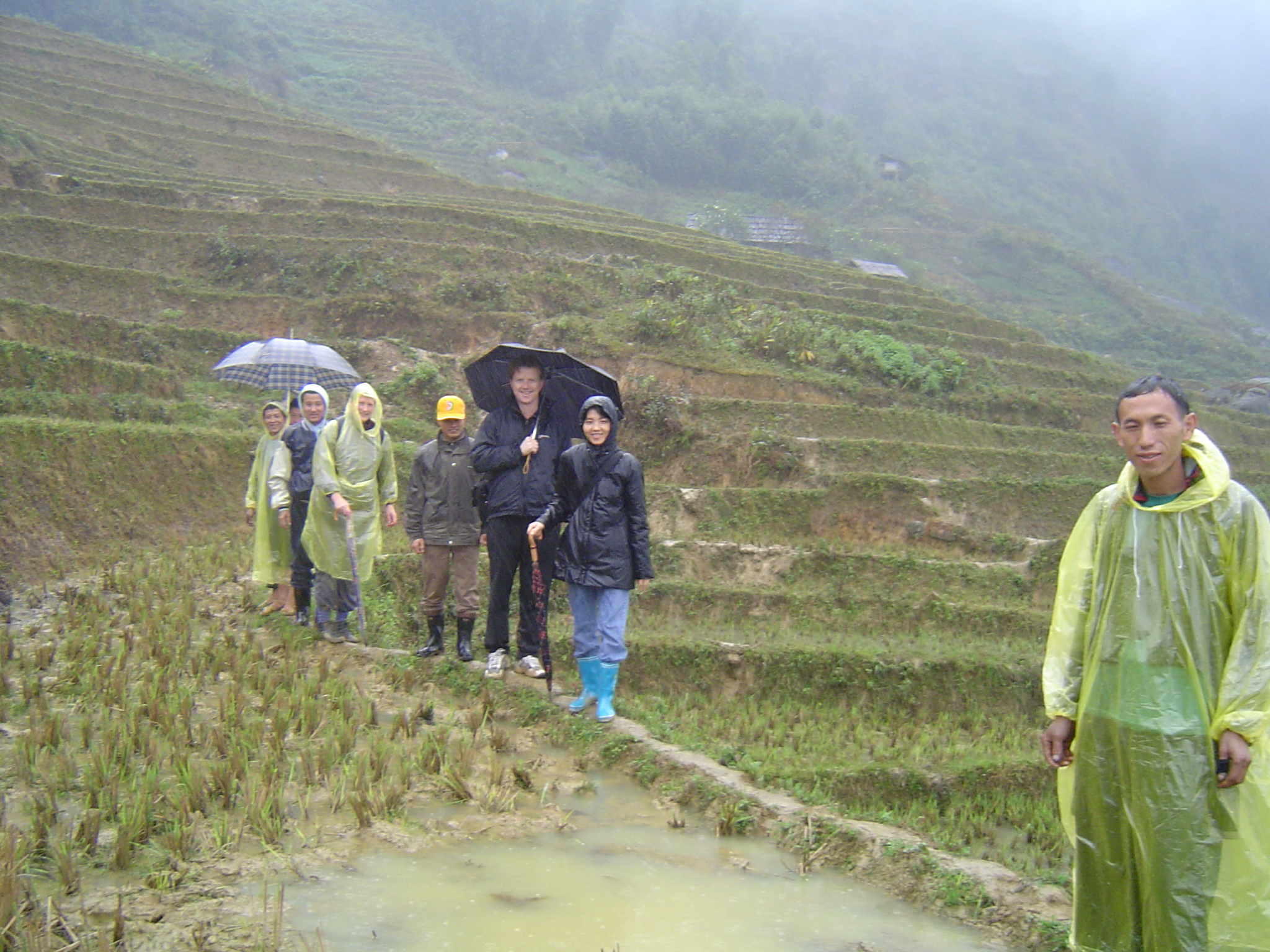
The photo I dug up for Tuesday’s post of me wandering about in rainswept paddyfields in Vietnam got me thinking about a recurrent theme of the last 20 years at Oxfam (and earlier jobs too): the role of personal humiliation, shame and failure in learning.
First the Vietnam example. I went there full of the 2005 hubris I described earlier. Oxfam’s big campaign at the time was on trade (in)justice, and we had just published a paper laying out the unfairness of the rules governing Vietnam’s accession to the World Trade Organization (WTO). It was a deeply skewed process in which existing members could gang up on newbie applicants, taking it in turns to demand more and more concessions from the Vietnamese, each of which then had to apply to all the existing members.

The Vietnamese government was delighted with our criticism of the negotiations and granted us a meeting with a member of the Vietnamese Politburo – great theatre: busts of Ho Chi Minh, marbled halls, red carpets, the lot. Opposite us sat a very polite elderly woman. I launched into a patronising presentation of the paper, full of that 2005 arrogance I talked about on Tuesday (probably laced with a dose of unconscious colonialism, sexism and ageism): ‘you have to realize they are bullying you, it’s so unfair etc etc’. She listened politely and then said words to the effect of ‘well, you know, we lost 2 million lives in the American War, I think we’ve got this’. I suddenly saw who was sat opposite me, probably a veteran of the war, a senior political figure with all the experience I lacked. I wanted to curl up and die.
That initial jolt made me reflect on all those -isms, and the importance of trying to understand the power and ‘point of view of the other’ (PoVO) in any conversation.
I don’t know if this is my individual pathology or a more general phenomenon, but those moments (and plenty of others ☹ – see below) stay with me. I learn far more from them than from any compliments or successes.
A couple more – my Oxfam colleagues often think I’m too big for my boots, so these are partly for them to enjoy…..
In 2010, Oxfam was preparing for a big new campaign called Grow. The idea was to move from the negative framing of injustice, violation and poverty to a more positive frame that would help counteract the accumulated impact of decades of ‘poverty porn’ and respect the agency of countless individuals and communities around the world. Fresh off the back of the launch of ‘From Poverty to Power’ (the book, not the blog), I said I would write the big campaign report. These were huge set pieces – the foundations on which big global campaigns stand or fall – and I thought I was just the person to do it.

Boy, did I get that wrong. What I failed to recognize was that I had already fallen out of love with Oxfam’s campaign model and the way of writing needed (not helped by doing my PhD at the time). I couldn’t get the tone right (my boss at the time: ‘why do you quote Charles Darwin – couldn’t you quote Bob Marley?’), and I failed to come up with the kind of killer facts that any campaign needs (confession, I’m not a real researcher who can do that kind of thing). A lamentable cocktail of arrogance and lack of self-knowledge. As the campaign launch day approached, the pressure of the slow motion car crash grew and I ended up with attacks of vertigo and going into hospital with some weird tomato-sized abscess on my face.
The report was taken away from me, and a fellow researcher, Rob Bailey was drafted in to do what was needed, ahead of the launch in 2011 (backed by Lula, Desmond Tutu and Scarlett Johansson!).
As for me, the blog came to the rescue. My boss (he of the Bob Marley appeal) took me out to tea in a cafe on the Euston Road and said words to the effect of ‘normally, we’d sack you, but too many people are reading your blog. You can’t stay as head of research, so we need a job title that sounds important but means nothing’. And that’s how I became Oxfam’s ‘senior strategic adviser’.
Lessons? Know your limits, and build your public profile just in case.
One more (what the hell, I’m leaving anyway). Getting a lesson in the power of localisation. Just after I joined Oxfam, I was sent to the lake district on a management leadership course with a bunch of other supposed ‘future leaders’. It was awful. In one of the exercises, two teams had to play remote human chess. Some of them were chess pieces on the board. At a distance were their randomly selected ‘managers’ (I was one of them). The only connection between them was a runner and there was added time pressure.

Me and my fellow manager were provided with a chess set, so we duly set out our chess pieces and tried to run the show without being able to see the board. The other team had Kate Raworth (later of Doughnut Economics fame) as manager, who sent a message through to the players asking ‘any of you play chess?’ When they said yes, she said ‘over to you’ and went off and had a cup of tea. We remote-controllers got slaughtered.
That was my first lesson in the power of localization and ‘handing over the stick’ and I’ve never forgotten it.
I have plenty more where they came from, but that’s enough for one post and I’m not contemplating a series (sorry!). How about you – do you learn from success or failure? Any juicy examples?
One of my earliest.. a twenty something me, working for the Lanka Mahila Samiti (a network of Sri Lankan women’s societies), running as was popular in those days a USAID funded Small enterprise development for rural women (SEDP) project. The women producers in this particular samiti (society) were coir rope makers. As way of explanation, coir is made from the fibre of coconut husks and involves a process of retting (soaking in salt water), then beating out the fibre, drying it out and then semi-manually spinning it into rope. This last stage requires skill and is done by women in fisher communities in Sri Lanka’s south. It is an important source of supplementary income for families coping with the precarity of small scale fishing. Of course middle men and the industry exploited the women producers and SEDP was trying to change the dynamics and ”empower” the women.
The samiti is being visited by some local government officials. The president of the samiti introduces me: this is our Priyanthi miss, she says, she is a real expert on the coir industry, knows all the processes, works out the costs and the prices, knows who we should sell to, she really is an expert. I blush through my brown skin. She adds: and like a true expert, give her the practical task of spinning the rope, and she cannot!!!
Carried that story into consultancy and the working world of development expertise.
P.S. Found this OXFAM paper on the coir industry written about 15 years after I worked with these women https://s3.amazonaws.com/oxfam-us/static/oa3/files/coir-research-summary.pdf
Author
Love it Priyanthi – a new definition of ‘expert’!
Great blog post Duncan! Keep them coming..
BTW, have you ever come across “Perceptions and Practice: An anthology of impact assessment experienes” by Kay Sayce with Patricia Norrish, published by CTA 2006.
We need more biographical accounts..
regards, rick davies
Oh my goodness Duncan, what interesting reflections. As someone who worked on the trade campaign and the Grow campaign, these are all poignant examples for me. Here’s my story. In 1995, before I came to Oxfam, I was working an NGO which was trying to support African public broadcasters in setting up a news exchange, and there was enthusiasm to use the Internet do make this happen. I was doing various things to promote the use of email and Internet for our partners across the global south. Using the Internet is a no brainer today, but back then there were very few internet providers across Africa. And many of the newsrooms had no computers. So we came up with a scheme to purchase decommissioned PCs in the US, ship them all to Dakar, run a workshop for all the broadcasters, during which we would already set up and simulate the email system they would use, and then the (desktop!) computers could be taken or shipped back to the various home countries of the participants. In today’s parlance, we were setting up a an online chat group, but in a very expensive and inefficient way. At the time, it seemed justified because the “digital divide” was so great. When I got to Dakar, it predictably all started going wrong. Several of the PCs didn’t work at all. And the simulation didn’t work very well. And after the training, several more PCs didn’t make it to where they were meant to go, or were damaged in the process. I have always felt ashamed about that, and indeed the lessons stuck with me – too many to mention. Probably the biggest lesson was that it is a bad idea to ship outdated equipment to other continents. But also that with ambitious plans you should add in reality checks and a healthy dose of risk management. Oh my goodness – it’s still painful to look back on this! It was a great lesson.
Author
Love it (other) Duncan!
Hi Duncan
Fantastic post – and from Ms Fernando, what a great story! I’m not from the charity sector in my career, but have enjoyed reading your blog over the past few years. Mistakes as a result of hubris are not solely experienced by one area of endeavour ☺️.
Your writing has always been entertaining and great food for thought. Thank you.
Best wishes
Kim
Author
Thanks Kim, v kind
What a delightful piece. Thanks for sharing. Of course I have no examples, I’m perfect… of course not. Yea learn from my having to eat humble pie, and also watching others as they eat theirs
Author
Thanks Akosua, would leave to hear your stories!
Brave and vulnerable of you to share the feelings you experienced while working at Oxfam. I see people on the blog have commended you. But I know bringing up how one feels can be quite provocative. I remember being de-friended by a few people when I talked about the shame I experienced working at a UK based think tank. I guess it helps having your profile/identity and being in your circumstances – on your way out (not that I’m envious or anything)! Hearing about other’s feelings can put people in touch with their own feelings, which can be quite painful – and the way we deal with it is by saying its just their own pathology – they need to see a therapist!
But feelings can say something about the system we are working in. So the shame you felt, although painful, might indicate how others are feeling. Perhaps it said something about the experience of the Vietnamese government and their people after being made to make so many concessions in joining the WTO club or comparing their ‘standard of living’ with the that of people in Europe and North America. Or it could represent the shame felt by those in advocacy organisations who are under pressure from so many quarters, from funders from the public, to bring about positive change in so called ‘developing countries’, where the reality is the contribution of an oxfam is just one of a myriad factors which shape policy and practice. It can call into question one’s identity – who am I as an advocate and what am I doing? But getting in touch with shame (and/or guilt) can provide the basis for reparations amongst the more powerful.
I guess making sense of the shame can only come if you stay with it. But all too often we defend ourselves against it, often through aggression – which often results in envious attacks, where people attack what might actually be good for them, including spaces for reflection and learning, leadership and connection – cutting off their nose to spite their face. Perhaps doing this might help, as it keeps them in a job. Advocacy and campaigning organisations often channel that aggression into their work, but can often leave them fragmented and burnt out.
Finally, I’m glad you’re calling out the ‘experiential’ leadership courses that organisations often pay a lot for. I think they tend to miss opportunities to hone capacities for sense making, reflexivity and improving practical judgement. What they can do is to help leaders cope with the anxiety they experience first by making them feel better (ah, I’ve done some training, tick) and giving them tools and techniques (or solutions) to deny their anxiety (which rarely help them in the day to day hurly burly of organisational life). I’ve heard such courses being framed as ‘edutainment’ I think instead action learning, and narrative writing are the way to go when it comes to leadership development. Perhaps your make change happen course for leaders builds on the lessons learnt from such leadership courses?
Great confessions- well received. In Southern Africa during Front line times- all of us donors in Zambia would have monthly confessions on the muck and mudle we created in the name of development and solidarity support.
It was so useful and cleansing.
Author
Think the Catholics might be onto something there, Push!
I will never forget the visit I organised for a group of young civil servants recently inducted into the government service earli in my career to rural communities. The civil servants belonged to the elite civil services of Pakistan and were considered among thebrightest in the society. The visit was to community groups who were doing wonders in development at that time. The meetings with the community groups began with a narration of the communities’s achievement by their elders: the number of groups organised; the leadership trainings received; the community infrastructures built and maintained; credit and savings made; problems solved and how communities enforced their rules, punished those who failed to obey them etc
Listening to them one of the civil servants arrogantly asked who had given them the authority to make rules and punish recalcitrant members. It was obvious he believed this area belonged to them. A community elder replied that it was nothing new. This was something they had been doing for centuries. The next question was about leadership. A civil servant remarked that they found that all the leadersip in the community groups were illiterate . They wondered why no educated University graduate was leading them. The prompt reply by an elder was was to ask whether Universities produced educated people.
The lessons of the meeting lived with me over the next thirty years as I tried to bring the world of aid and development closer to the reality of the communities to make it more meaningful for them.